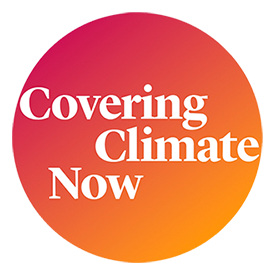 This column is part of Covering Climate Now, a global journalism collaboration cofounded by Columbia Journalism Review and The Nation to strengthen coverage of the climate story.
This column is part of Covering Climate Now, a global journalism collaboration cofounded by Columbia Journalism Review and The Nation to strengthen coverage of the climate story.
Last month, I sat on a panel about the language around climate change and what it says about us. We talked about how our words frame who we think is responsible, what casualties are allowable, what’s possible, and who is silenced. We discussed those pesky phrases that create the illusion of blanket blame (“human activity”) and those that obscure the existence of climate change (“extreme weather”), but I soon noticed the conversation in the Zoom chat devolving down a familiar path: the hunt for the “perfect word,” complete with self-righteous policing of every word that came out of one another’s mouths—or, in this case, keyboards.
I write a lot about what’s wrong with the ways we talk about climate change. Just a few weeks ago, I cowrote a five-point platform to reform climate coverage with my partner in crime, Amy Westervelt. So, before I go too far in this essay, I want to acknowledge how much better climate coverage has gotten over the past few years. I’m old enough to remember when climate articles tended to be either so dense with scientific information you needed an advanced degree to understand them or were simple lifestyle articles about all the ways to avoid plastic straws. But it is no longer taboo to talk about climate change as a justice issue or argue that its roots lie in colonialism. It’s now understood that, as Amy says so often, the threat is the power structure, not the power source.
I think a great deal of that change is a result of the scientific community’s adopting more urgent language and of the demands of communities usually marginalized out of the conversation to have their turn at the mic and their refusal to censor themselves when they get it. The disabled community, the LGBTQ community, women, and people of color have helped make the discourse more robust, accessible, and effective.
When we’re investigating the language we use around climate change in an effort to make it more inclusive and affecting, we’re on the right track. But when we’re twisting ourselves into linguistic knots to persuade the unpersuadable… well, what are we really doing? Whom are we really serving?
One of the tricky things about climate change is this pernicious idea that once we find the “right word,” all the barriers to climate action will come tumbling down. For example, if we revert back to “global warming” instead of “climate change”—“climate change,” after all, was introduced by a Republican strategist—the oil and gas industry is not going to tuck its tail and retreat. Climate change is widely understood, and the GOP plan to make it sound less scary didn’t exactly work. Climate change is terrifying to nearly everyone. Or, another argument goes, if we create new words, we can avoid words with so much political baggage and make climate change the unifying issue it was always supposed to be, and logic will win finally the day.
That’s never going to happen. It doesn’t matter what we say. It’s not like opponents don’t know climate change is happening. The fossil fuel industry knew about it before I was born. The Republican Party knew, and even flirted with the idea of doing something about it. These people don’t need to be convinced; they need to be removed. So, inasmuch as we look for new words and slogans, it should be for the purpose of galvanizing those who want to be on the right side of history. To hell with those people who want to make sure history books are never written.
Furthermore, so long as we focus on what we want to destroy and spend precious little time on what we want to build, the fossil fuel companies remain in control of the narratives. So many of the words about climate action are couched in the negative: “decarbonization” and “dismantling” and “emissions reduction.” All things we need to do, all things we need to talk about, but there’s just as much to create as there is to destroy, and I think we’d do better to find some equilibrium.
I understand that language is always evolving, and of course we should evolve with it. I just want us to remember who we’re in this for: each other, not the fossil fuel companies and cronies. It’s time to de-center them from the conversation. All the scolding we do of one another for not hitting the exact right note can make people not want to talk about this at all. But climate change is hard to talk about because it’s hard to face, so I’d like to see people give a little more grace to the people who are trying.


